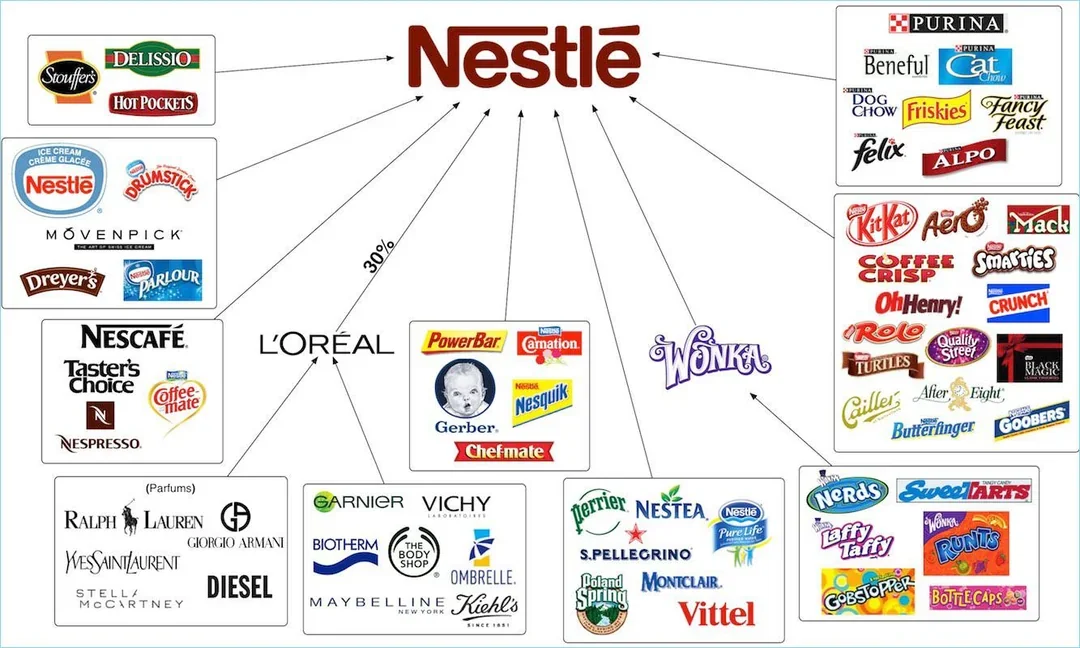Nestle: Profit without Ethics
Nestle’s Values & Governance
A popular news piece of the past couple weeks has been Nestlé (like Disney but for food, worth ~$244 Billion) firing it’s CEO, 63 year old Laurent Freixe over an affair with a company subordinate. A statement from Paul Bulcke, the Chairman of Nestle reads:
“This was a necessary decision. Nestlé’s values and governance are strong foundations of our company. I thank Laurent for his years of service at Nestlé.”
He went on to introduce Freixe’s replacement, the new and current CEO of Nestle, Philipp Navratil:
“I am pleased to announce Philipp Navratil as CEO. Philipp is recognized for his impressive track record of achieving results in challenging environments. Renowned for his dynamic presence, he inspires teams and leads with a collaborative, inclusive management style. The Board is confident that he will drive our growth plans forward and accelerate efficiency efforts. We are not changing course on strategy and we will not lose pace on performance.”
I’d like to look at this brief statement from Bulcke, and the situation as a whole in a wider context. The initial response from anyone reading the headline “Nestle sacks CEO over ‘undisclosed romantic relationship’” (The Guardian) may take the headline as the whole story. A CEO fooled around on his wife with an employee and got caught. The Chairman and Board as a whole were so aghast that they replaced the CEO immediately. “Values and Governance” and all that. Ah, but it’s not about the fact Freixe humiliated his wife on a global stage, it’s the fact that it was with a “subordinate”. Power dynamics are the issue- you have to hold control over subordinates by threatening their livelihood and stringing them along with promises of advancement until they know nothing else but you. That’s the proper way to use your power dynamics in the executive world.
It was not a concerned member of the company, but Freixe’s “mistress”. She discovered that Laurent was cheating on her as he was cheating on his wife, so she called an employee tip line. The offense that brought his world crumbling down was not cheating on his wife with his mistress, but cheating on his mistress with his “subordinate”.
The message is clear: “Nestle does not care about what you do in your spare time, unless it could affect our bottom line.” And generally, that seems to be the rule for anyone in power. You can have your affairs, your drug habits, you can kill people half-way across the world away- just don’t shit where you eat.”
But why point out this hypocrisy now? Honestly, I thank Chairman Bulcke. That line about “Nestle’s Values” made me laugh- less with humor than disgust.
Let’s look back on our favorite pseudo-monopoly’s actions, guided by their strong and foundational values.
1867 - Present: The Baby Formula Lie
Nestle spent decades advertising their baby formula as being superior in nutritional value to breast milk. This particular marketing jaunt resulted in focused marketing to low and middle income markets, encouraging new mothers to buy their product, not breast feed, if they really cared for their baby’s health. The result, according to an article on VoxDev, may have resulted in the deaths of over 200,000 infants due to formula mixed with unsafe drinking water. Even with the science pointing to breastmilk being generally healthy for a newborn, after this revelation Nestle persisted in its marketing to low and middle income markets, especially in “third world” countries. They would give formula to hospitals, where women dressed as nurses would sometimes feed infants the formula as a way to encourage new mothers to switch on to their product. Access to clean drinking water is not Nestle’s problem, unless you’re going to buy their water. As we’ll soon find out, Nestle is very much in the water business.
~1980’s - Present: Child Slave Labor
Nestle, as well as Mars and Hershey’s, regularly get their cocoa beans in part from the Ivory Coast. In 2001 the chocolatiers and child-users accused signed a pledge to get rid of child labor used in their cocoa suppliers by 2005, a date which they kept bumping further and further into the future. Here is a link to an excellent expose done by the Washington Post in 2019, but even that wasn’t enough for Nestle to actually effect change. There is no accountability, no livable wage for the boys they’re exploiting, but hey, their profits are trending upwards. Efforts to hold Nestle and other Autocratic Companies accountable for their use of child slave labor have been repeatedly defeated in court. Even if an accused company is found guilty in the first case, the U.S. Court of Appeals for the District of Columbia Circuit has their back. Further reading on this court’s rulings in favor of major companies can be found in this article from Reuters.
1988 - Present: “Water is a Need, It Is Not a Right”
Nestle first entered the bottled water game in 1992. Peter Brabek-Letmathe, then Chairman of Nestle, was a little too candid in a 2005 Interview with We Feed the World:
“It's a question of whether we should privatize the normal water supply for the population. And there are two different opinions on the matter. The one opinion, which I think is extreme, is represented by the NGOs, who bang on about declaring water a public right. That means that as a human being you should have a right to water. That's an extreme solution. The other view says that water is a foodstuff like any other, and like any other foodstuff it should have a market value… Personally, I believe it's better to give a foodstuff a value so that we're all aware it has its price, and then that one should take specific measures for the part of the population that has no access to this water."
-Peter Brabeck-Letmathe, 2005
It being the early days of social media in 2005, Brabeck-Letmathe was still hit with backlash over his statement and quickly walked it back. He decided to explain that he meant only 98.5% of the world’s drinking water isn’t a human right. Wait, what?
Yes, this millionaire who until recently was the interim chiarman at the World Economic Forum, is more concerned with resource allocation than profit allegedly. It was all about a sustainable future, and not the fact that Nestle is the world’s biggest provider of bottled water. Nor is it the fact that they are constantly hit by reports from watchdog groups and local organizations about stealing water from indigenous communities, or using fraudulent purifying techniques, or their efforts to buy more springs in places where droughts are common, or setting up facilities to leave vast swaths of people in the surrounding area without access to their own free drinking water (Here’s another example in Pakistan). While the Chairmans and CEO’s may have changed, Nestle’s aspirations for cornering the water market have not.
1920’s - Present: Columbia Union Busting with Paramilitary Helpers
Nestle has a habit of buying production plants in other countries with the stipulation that any active unions are disbanded. Nestle then has a tendency to hire “security forces” to “keep the workers safe”, though reports from the workers themselves suggest they are meant as a warning to those who would interfere with their operations, be it through sabotage or the unforgivable sin of asking for better wages. In September of 2005, a unionist named Luciano Romero, employed at Nestle subsidiary Cicolac, was abducted and murdered by a paramilitary group. Conveniently for Nestle, Romero was getting ready to testify about links between paramilitary groups and Cicolac It is noted in a report from the Global Policy Forum that these paramilitary groups seem to work in tandem with Nestle’s goals, such as union busting and the disappearance of problematic unionists. When brought to court over Nestle’s responsibility to keep its workers safe, and over the slander their representatives spread about unionists that lead to the death of people like Luciano Romero, it was dismissed by the European Court of Human Rights. When Romero’s widow tried her last legal avenue of recourse, the case was transferred by the prosecution to a court in the Swiss canton of Vaud, which has jurisdiction over one of Nestle’s Headquarters. The prosecutors in Vaud then closed the case in 2013. At least 12 union employees at Nestle-owned locations have been killed since 1985, and that’s just the reported deaths. And that’s just in Columbia.
Court systems where either party has an active economic investment in the proceedings do not work. Nestle knows that. Columbia is far away from Europe, and with a GDP of $427 Billion v. Nestle’s estimated net worth of ~243 Billion, it’s a lot easier for the company to throw their weight around. A statement from the GMB, a Columbian union, in March of 2025, calls for Nestle to respond to it’s “serious violations of labor and human rights”. The link to the full complaint can be found here.
Nestle is not just about chocolate and water. They’re about deforestation and microplastics as well. I’d love to write more about these vampires and their crimes, but I’ll save it for another day.
In conclusion, Nestle is one of the most openly corrupt and criminal companies in the modern world, and have been for decades. They are by no means unique, but for the time being at least they are well-documented in their atrocities. I would encourage anyone not to buy their products, and to treat with suspicion the promises of companies that lie pathologically. After a business grows to a certain size it can be reasonably assumed they did so by making money and that they wish to make more. Their priority will never be people first, profit second. Their end goals are always going to be oriented towards making a profit. If we remember that, and get some people with actual spines to take office, if we can make the change to put people first, we might stick in their fanged-gums well enough that the whole body gets infected and dies. The world ill needs companies like Nestle.
For further reading, please see this link to a newsletter written by the Global Policy Forum all the way back in 2002, as well as the chart below.
A handy guide to help you not give Nestle money. Credit to u/VirusB1ack0ut on Reddit.

